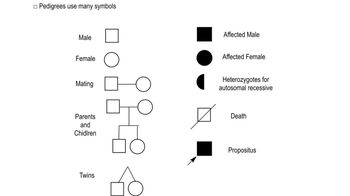- 1. Introduction to Genetics51m
- 2. Mendel's Laws of Inheritance3h 37m
- 3. Extensions to Mendelian Inheritance2h 41m
- 4. Genetic Mapping and Linkage2h 28m
- 5. Genetics of Bacteria and Viruses1h 21m
- 6. Chromosomal Variation1h 48m
- 7. DNA and Chromosome Structure56m
- 8. DNA Replication1h 10m
- 9. Mitosis and Meiosis1h 34m
- 10. Transcription1h 0m
- 11. Translation58m
- 12. Gene Regulation in Prokaryotes1h 19m
- 13. Gene Regulation in Eukaryotes44m
- 14. Genetic Control of Development44m
- 15. Genomes and Genomics1h 50m
- 16. Transposable Elements47m
- 17. Mutation, Repair, and Recombination1h 6m
- 18. Molecular Genetic Tools19m
- 19. Cancer Genetics29m
- 20. Quantitative Genetics1h 26m
- 21. Population Genetics50m
- 22. Evolutionary Genetics29m
Galactosemia is an autosomal recessive disorder caused by the inability to metabolize galactose, a component of the lactose found in mammalian milk. Galactosemia can be partially managed by eliminating dietary intake of lactose and galactose. Amanda is healthy, as are her parents, but her brother Alonzo has galactosemia. Brice has a similar family history. He and his parents are healthy, but his sister Brianna has galactosemia. Amanda and Brice are planning a family and seek genetic counseling. Based on the information provided, complete the following activities and answer the questions.
Draw a pedigree that includes Amanda, Brice, and their siblings and parents. Identify the genotype of each person, using G and g to represent the dominant and recessive alleles, respectively.
 Verified Solution
Verified SolutionVideo transcript

 2:48m
2:48mWatch next
Master Pedigree Symbols with a bite sized video explanation from Kylia Goodner
Start learning




